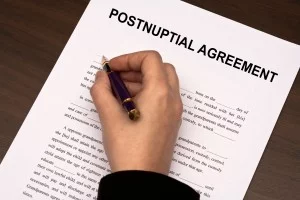
What is a postnuptial agreement? A postnuptial agreement is a written document a couple signs after they marry, or enter a civil union. Couples use them to agree to the terms if they separate or enter a divorce. They usually sign the document and have their signatures notarized. State law plays an important role in the verbiage and enforceability of such agreements.
By and large, a Divorce is one of the most financially destructive events a person can endure. There are legal methods to keep the courts from dividing your assets in a divorce. One method is executing a well drafted and reviewed prenuptial agreement. Generally, you and your fiancé need independent representation. You provide full audit disclosure of your finances. The law often requires sufficient review time. With a proper agreement, it is more difficult to challenge in court. But how many of us throw in a day with a divorce lawyer as part of the wedding plan? When you marry, you combine more than the medicine cabinet. In the event of a divorce one’s personal financial future is on the chopping block.
Here are a couple of ways that you can use to pro-actively protect your assets from a marital property battle or lawsuit.

Marital Agreements
This is a proactive step and divorce attorneys highly recommend them. It is a manner by which to separate personal assets in marriage. These agreements essentially supersede your state’s “general standard” as established and outlined its marriage laws. Attorneys often contest nuptial agreements. To hold any water you want to make sure that the language coincides with the marriage agreement laws in your state.
When an agreement is fair and includes the relevant information about assets, divorce courts commonly accept marriage agreements as a matter of course. That is, prenuptial and postnuptial agreements. If for any reason your spouse challenges it, or if the court believes that someone forced one of the parties to execute the agreement under duress, the courts can easily throw out the agreement. This is also true if any of the assets were undervalued, not disclosed or other discrepancies were found. The biggest reason courts throw these contracts out is due to the concealment of assets, coercion and fraud.

Postnuptial Agreements
Postnuptial agreements serve the exact same purpose, except couples execute them after marriage. Couples generally use them when there has been a dramatic financial change in the household. There’s no public data to compile on divorce settlements and marriage agreements. But the fact is, pre and postnuptial agreements only work if you still agree at the time of divorce. Once the arguments start, just about anything can happen. One party can claim that she didn’t have sufficient time to review the agreement before having to sign. She can claim she simply didn’t understand what it meant, or didn’t have an attorney present. Any number of things can trigger a marriage agreement being challenged in court. Each state varies on how it views these agreements and how it permits challenges to them.
Unlike asset protection strategies, marriage agreements do not provide complete sleep-at-night protection of your property or business income in a divorce. Alternatively, spousal agreements, although relatively simple and harmless, do not have a solid case law histories. They do not have solid track records of consistently protecting asset ownership in property disputes.
Here is another consideration. Let’s say you and your spouse have a marital agreement that specifies your share of the estate. Then someone sues your spouse. The agreement does not protect your share of the assets in your spouse’s name. The main way to ensure that your legal opponent cannot use your assets to satisfy a judgment is to protect them with a personal asset protection strategy.

Separation of Property
Securely placing your estate into an asset protection strategy can offer sleep-at-night peace of mind. The concept is to place your separate personal property, business income and retirement savings into a personal asset protection plan. Thus, you can provide protection from future liability. This is a powerful divorce asset protection strategy. When you get married, the property acquired during a marriage is generally considered a joint asset. What you had before the marriage is your separate property. This includes your business income, retirement savings, investment accounts and property that you acquired before the wedding. Asset protection is utilizing legal and lawful techniques to shield your personal assets from predatory litigation, divorce and lawsuits.
The most effective legal tool for protecting assets from a spouse is the asset protection trust. Whereas domestic (US-based) asset protection trusts exist, they do not have commendable track records. A US-judge can seize US-assets regardless of their structure. Hiding assets in a divorce can land you in hot water. So, in order to take control of your assets, set up an offshore asset protection trust. The Cook Islands, Nevis or Belize display the strongest case law histories.
In summary the offshore trust is one of the best and most powerful divorce asset protection strategies. You can read more about these trusts in this website. Plus, there are phone number above as well as an inquiry form on this page so that you can discuss these options.



